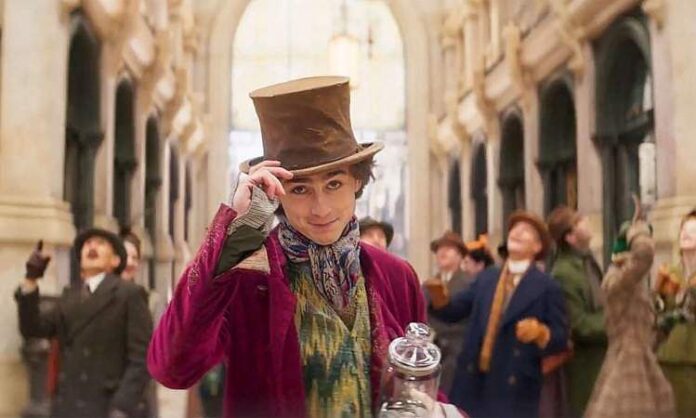Eccentricilious. In a normal world that word may not make sense, but it does in a world where the top hatter and darkly humorous chocolatier Willy Wonka is present. When he has hot chocolate for a nightcap, fashions sweet treats out of sunlight and thunderclouds, concocts a hair repair eclair, and sings that he has a hatful of dreams, you know magic, charm, and confectioneries is aplenty right in time for the Christmas season.
The makers of Paddington 2 — Paul King and Simon Farnaby — continue their charm of showcasing innocence in Wonka too. In Paul and Simon’s musical, Wonka, played by a charming Timothee Chalamet, is not the one who possesses a sinister trait that punishes ill-mannered children. Instead, he is the one who comes to Paris after seven long years at sea with a dream. A dream to showcase his craft of creating chocolates. Given the wackiness of Willy Wonka and the naivety he comes with, it’s easy to believe that plot-scheming urban nature robs him of everything. And Wonka too gets charged for daydreaming. Wonka soon ends up repaying the debts of Mrs Scrubitt (Olivia Colman), a lodge owner, who along with her partner in crime Mr Bleacher (Tom Davis), charges him a ‘stair’ fee to access his room, for using a sliver of “mini-bar” of soap in his room, all ending up with him owing them 27 years of slavery. Later, we learn that orphan Noodle (Calah Lane) has had it worst for being picked up as a baby and has to repay the duo for the “privilege” of kindness she has been shown. Others in the clan of slaves include accountant Larry (Rich Fulcher), telephone operator Lottie (Rakhee Thakrar), and Piper (Natasha Rothwell). When Noodle rightly says, “The greedy beats the needy”, it hits us true and harshly.
Cast: Timothée Chalamet, Calah Lane, Olivia Colman, Hugh Grant, Rowan Atkinson, and others
Director: Paul King
As they all strive to get together and break out of the clutches, there is something magical in the way the creators choose to present the film musically. The songs are staged and assembled most delightfully. The best song is the one with Wonka and Noodle, who sing about hope and happiness after they return from milking a zoo giraffe for one of their exquisite creations. The duet, featuring a man who has dreams on his sleeves, and a girl who has just reaffirmed her hope, melts your heart more than a chocolate bar kept under a scorching sun.
Wonka, in a subtle yet rewarding way, pays homage to Roald Dahl’s previous works and the 2005 film Charlie and the Chocolate Factory. For instance, when Mrs Scrubitt sings her cruelty while locking up Noodle, there is an uncanny resemblance to Miss Trunchbull from Matilda. A shot of the gigantic weightage that Olivia’s face gets, takes you back to the exact shot of dictating headmistress scaring Miss Honey and her children away. In another instance, a newly opened Wonka store with a chocolate river, boat, and cherry blossoms, feels like a throwback and tribute to marvellous visual we once were marvelled by when Wonka opened his factory for the first time to five lucky children.
In a way, Wonka is a reflection of its iconic parent film, Charlie and the Chocolate Factory. There is an indispensable mirroring effect when both, in their underlying tones, are rooted in parental sentiments. If Wonka had a dysfunctional and skirmish relationship with his dentist father in the 2005 film, the latest is a showcase of warmth and an inspiring tale of the mother and son bond and Noodle’s affirmation to find her family. Despite Wonka not attempting to bridge a connection and refer to the two parental tales of Wonka, you understand, relate and reminiscently smile when Wonka understands it is not always about the chocolate, but the one with whom you share it. After all, didn’t Wonka realise that after Charlie shows him around his humble abode?
Sandwiched among all this, is Hugh Grant as Oompa Loompa, the precarious yet noble creature who eventually becomes the workforce of Wonka. The film never really delves into the relationship that these minuscule creatures have with the chocolatier. Barring an instance of cocoa bean ownership, which makes him secretly sneak in and steal Wonka’s creations, there isn’t much for the dwarf-folk in the film, and that makes it sad to have expected more on how this master-labourer workforce ever happened and how the equation was ever settled. The makers also seldom give attention to the legendary Rowan Atkinson who plays the corrupt clergy, Father Julius, who is in cahoots with a chocolate cartel run by a trio. Rowan, in his limited scope and presence he gets, gets claps, but gets thwarted by his underdeveloped arc.
With the latest addition to the land of sweets and meticulously crafted set pieces, one thing is clear; in the universe of this film, chocolates are prized possessions, and makers treat it the right way. When blocks of sweet treats can bribe adults, chocolate fountains and death by chocolate are taken in the literal sense, the land of Wonka becomes a beautiful immersion of our childhood times. As Wonka, with a sweet tooth, wades through the rolling credits with a smile plastered on his face, the film affirms the importance of reconnecting with those times… the times when happiness could be found at the sight of the smallest achievements, and happiness generally meant… chocolates.
#Timothee #Chalamets #musical #wafer #chocolate #thinly #layered #exquisit #Cinema #express

